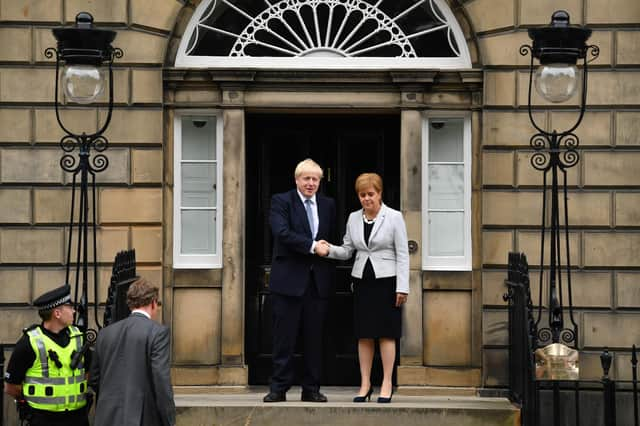Even governments can see it’s good to talk - John Sturrock


A rather depressing aspect of the constitutional impasse in the UK is that inter-governmental relations (IGR) between the UK and the Scottish (and indeed Welsh) Governments seem to have worsened in recent years. This has been exacerbated in the post-Brexit era with the UK Government’s Internal Market Act, addressing funding and distribution of powers hitherto affected by EU regulation, perceived as a “power grab” by the devolved governments. That said, the Covid pandemic and challenge of climate change (with the hosting in Glasgow of COP26) has necessitated a degree of serious cooperation in these and other areas in the past two years.
Recently, following a review of IGR, new structures have been proposed. These, it is said, will “provide for ambitious and effective working, to support … COVID recovery, tackle the climate change crisis and inequalities, and deliver sustainable growth.”
Advertisement
Hide AdAdvertisement
Hide AdThe new arrangements are “built on principles of mutual respect and trust, respecting the reserved powers of the UK Government and Parliament and the devolved competences of the Scottish Government, Welsh Government, Northern Ireland Executive and their legislatures. The new system will provide a positive basis for productive relations, facilitating dialogue where views are aligned and resolution mechanisms where they are not.”


Further detailed principles emphasise effective communication, respecting confidentiality, accountability and resolving disputes according to a clear and agreed process. To those of us involved in conflict prevention and management, this all seems like good stuff.
The review also says that on “matters of mutual interest, the governments will seek to proceed by consensus, including ensuring the earliest possible resolution of issues.” Among other provisions, intergovernmental machinery should “promote dispute avoidance by ensuring there are effective communication and governance structures at all levels, from working-level officials to ministers”.
Expanding on dispute resolution and avoidance, all governments “are committed to promoting collaboration and the avoidance of disagreements… The resolution process … should be seen as part of a much wider system of active IGR, and as a process of last resort.” Again, an approach where emphasis is placed on prevention and early management of disputes, with recourse to dispute resolution as a last resort, is to be applauded.
One function of a newly-established IGR Secretariat is facilitating the process of dispute resolution. This will include “assessing whether the appropriate steps have been followed to resolve a disagreement and decide whether it should be escalated as a dispute ...” Where appropriate, the Secretariat “will appoint a third-party to provide third-party advice or conduct mediation…”. This is reinforced later: “If required, an independent mediator will be appointed, as agreed by the parties to the dispute, on the recommendation of the Secretariat. The timescales for the mediation process will be agreed by the parties.”
In the past, reference to an arbitrator or other adjudicative function might have been chosen for dispute resolution. Overall, therefore, this feels like a major shift, not only in UK IGR, but in recognition generally of the opportunities offered by mediation to help resolve political differences rather than escalate them. This seems both sensible and realistic as it preserves the disputing parties’ autonomy to make decisions regarding any proposed solution with flexibility, rather than having one imposed.
In an interesting contribution to early conversations about negotiating Brexit, Horst Eidenmuller wrote: “Experience tells us that creating or at least preserving value in extremely complex multi-party negotiations will be much more likely if mediators guide the parties’ negotiations” including negotiations “with a (strong) political or public element.” The subsequent rather unsatisfactory outcomes of Brexit negotiations with their tendency towards zero-sum, or lose-lose, results, may reinforce his point. We need to avoid this, if we can, in the future.
There could be a role for mediation in future discussions on constitutional issues, including the terms on which any referendums would proceed. Finding ways to work together more effectively seems essential in the current constitutional arrangement and, in the event of Scottish independence, cooperation would still be critical, given our geographic, economic and societal interdependence.
Advertisement
Hide AdAdvertisement
Hide AdRecent contested proposals on “levelling up” and overhaul of retained EU legislation suggest that IGR will remain hard work. However, in UK political discourse, perhaps mediation’s day is coming…
John Sturrock is Founder and Senior Mediator, Core Solutions